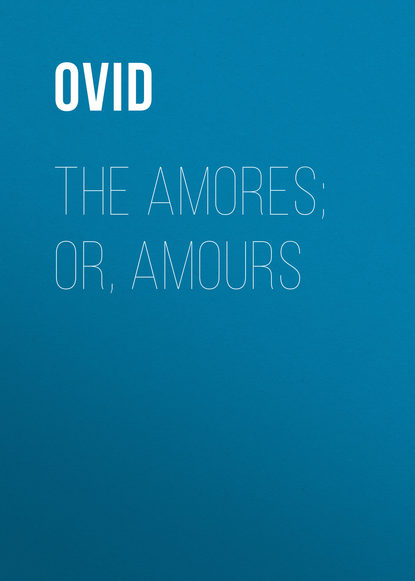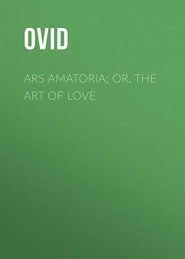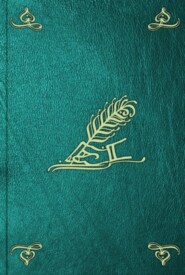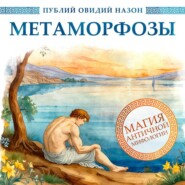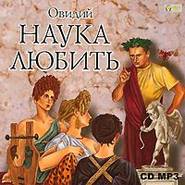По всем вопросам обращайтесь на: info@litportal.ru
(©) 2003-2024.
✖
The Amores; or, Amours
Настройки чтения
Размер шрифта
Высота строк
Поля
139 (return (#x2_x_2_i13))
[ The years which."—Ver. 5. The age for serving in the Roman armies, was from the seventeenth up to the forty-sixth year.]
140 (return (#x2_x_2_i13))
[ Of his general.—Ver. 8. He alludes to the four night-watches of the Roman army, which succeeded each other every three hours. Each guard, or watch, consisted of four men, of whom one acted as sentry, while the others were in readiness, in case of alarm.]
142 (return (#x2_x_2_i14))
[ The othert doors.—Ver. 20. From the writings of Terence and Plautus, as well as those of Ovid, we find that the youths of Rome were not very scrupulous about kicking down the door of an obdurate mistress.]
143 (return (#x2_x_2_i14))
[ Thracian Rhesits.—Ver. 23. See the preceding Epistle of Pénélope to Ulysses, and the speech of Ulysses in the Thirteenth Book of the Metamorphoses.]
144 (return (#x2_x_2_i15))
[ Cease to love.—Ver. 32. It is hard to say whether the word 'Desinat' means 'Let him leave off saying so,' or 'Let him cease to love': perhaps the latter is the preferable mode of rendering it.]
146 (return (#x2_x_2_i15))
[ The raving prophetess.—Ver. 38. 'Mænas' literally means 'a raving female,' from the Greek word paivopai, 'to be mad.' He alludes to Cassandra when inspired with the prophetic spirit.]
147 (return (#x2_x_2_i15))
[ At the forge.—Ver. 39. When he was detected by means of the iron net, as related in the Fourth Book of the Metamorphoses.]
148 (return (#x2_x_2_i16))
[ A lazy inactivity.—Ver. 41. When persons wished to be at ease in their leisure moments at home, they were in the habit of loosening the girdle which fastened the tunic; from this circumstance, the term 'dis-cinctus' is peculiarly applied to a state of indolence.]
149 (return (#x2_x_2_i16))
[ Couch and the shade.—Ver. 42. 'Lectus et umbra' means 'lying in bed and reclining in the shade.' The shade of foliage would have peculiar attractions in the cloudless climate of Italy, especially for persons naturally inclined to be idle.]
150 (return (#x2_x_2_i16))
[ To serve.—Ver. 44. 'Æra merere' has the same meaning as 'stipendum merere,' 'to earn the pay of a soldier,' whence it came to signify 'to sene as a soldier.' The ancient accounts differ materially as to the pay which the Roman soldiers received.]
151 (return (#x2_x_2_i20))
[ The Eurotas.—Ver. 1. The Eurotas was the river which flowed past the walls of Sparta. He is alluding to Helen.]
152 (return (#x2_x_2_i20))
[ Amymone.—Ver. 5. She was one of the Danaides, and was carrying water, when she was attacked by a Satyr, and rescued by Neptune. See the Epistle of Hero to Leander, 1. 131, and the Note to the passage.]
153 (return (#x2_x_2_i21))
[ Fold in his dress.—Ver. 18. The 'sinhs' of the 'toga,' among the men, and of the 'palla,' among the women, which extended in folds across the breast, was used as a pocket, in which they carried money, purses, letters, and other articles. When the party was seated, the 'sinus' would almost correspond in meaning with our word 'lap.']
154 (return (#x2_x_2_i21))
[ Avaricious procurer.—Ver. 23. 'Leno' was a person who kept a house for the purposes of prostitution, and who generally robbed his victims of the profits of their unfortunate calling. This was called 'lenocinium,' and the trade was not forbidden, though the 'lenones' were considered 'infames,' or 'disgraced,' and thereby lost certain political rights.]
155 (return (#x2_x_2_i21))
[ By compulsion.—Ver. 24. Being probably the slave of the 'leno,' he would use force to make her comply with his commands.]
156 (return (#x2_x_2_i22))
[ Hired dishonestly.—Ver. 37. The evidence of witnesses was taken by the Praetor, and was called 'jusjurandum in judicio,' whereas the evidence of parties themselves was termed 'jusjurandum in jure.' It was given on oath by such as the Praetor or other judge chose to call, or as either party might propose for examination.]
157 (return (#x2_x_2_i22))
[ The chest.—Ver. 38. The 'area' here means the strong box, or chest, in which the Romans were accustomed to place their money; they were generally made of, or bound with, iron or other metal.]
158 (return (#x2_x_2_i22))
[ Commissioned judge.—Ver. 38. The 'judices selecti' were the 'cen-tumviri,' a body of one hundred and five officers, whose duty it was to assist the Praetor in questions where the right to property was litigated. In the Second Book of the Tristia, 1. 93, we are informed that the Poet himself filled the office of a 'judex selectus.']
159 (return (#x2_x_2_i23))
[ That is purchased.—Ver. 39. Among the Romans, the 'patroni' defended their 'clientes' gratuitously, and it would have been deemed disgraceful for them to take a fee or present.]
160 (return (#x2_x_2_i23))
[ He who hires.—Ver. 45. The 'conductor' was properly the person who hired the services, or the property of another, for a fixed price. The word sometimes means 'a contractor,' or the person with whom the bargain by the former party is made. See the public contract mentioned in the Fasti, Book v. 1. 293.]
161 (return (#x2_x_2_i23))
[ The Sabine bracelets.—Ver. 49. He alludes to the fate of the Vestal virgin Tarpeia. See the Fasti, Book i. 1. 261, and Note; also the Translation of the Metamorphoses, p. 516.]
163 (return (#x2_x_2_i23))
[ The son pierced.—Ver. 52. Alcmæon killed his mother Eriphyle, for having betrayed his father Amphiaraus. See the Second Book of the Fasti, 1. 43, and the Third Book of the Pontic Epistles, Ep. i. 1. 52, and the Notes to the passages.]
164 (return (#x2_x_2_i23))
[ A simple necklace.—Ver. 52. See the Epistle of Deianira to Hercules, and the Tenth Book of the Metamorphoses 1. 113, with the Note to the passage.]
165 (return (#x2_x_2_i24))
[ Soil of Alcinoiis.—Ver. 56. The fertile gardens of Alcinoiis, king of the Phæacians, are celebrated by Homer in the Odyssey.]
166 (return (#x2_x_2_i29))
[ The straggling locks.—Ver. 1. The duty of dressing the hair of the Roman ladies was divided among several slaves, who were called by the general terms of 'cosmetæ,' and 'omatrices.' It was the province of one to curl the hair with a hot iron, called 'calamistrum,' which was hollow, and was heated in wood ashes by a slave who, from 'cinis,' 'ashes,' was called 'ciniflo.' The duty of the 'psecas' came next, whose place it was to anoint the hair. Then came that of the 'ornatrix,' who parted the curls with a comb or bodkin; this seems to have been the province of Napè.]
[ The years which."—Ver. 5. The age for serving in the Roman armies, was from the seventeenth up to the forty-sixth year.]
140 (return (#x2_x_2_i13))
[ Of his general.—Ver. 8. He alludes to the four night-watches of the Roman army, which succeeded each other every three hours. Each guard, or watch, consisted of four men, of whom one acted as sentry, while the others were in readiness, in case of alarm.]
142 (return (#x2_x_2_i14))
[ The othert doors.—Ver. 20. From the writings of Terence and Plautus, as well as those of Ovid, we find that the youths of Rome were not very scrupulous about kicking down the door of an obdurate mistress.]
143 (return (#x2_x_2_i14))
[ Thracian Rhesits.—Ver. 23. See the preceding Epistle of Pénélope to Ulysses, and the speech of Ulysses in the Thirteenth Book of the Metamorphoses.]
144 (return (#x2_x_2_i15))
[ Cease to love.—Ver. 32. It is hard to say whether the word 'Desinat' means 'Let him leave off saying so,' or 'Let him cease to love': perhaps the latter is the preferable mode of rendering it.]
146 (return (#x2_x_2_i15))
[ The raving prophetess.—Ver. 38. 'Mænas' literally means 'a raving female,' from the Greek word paivopai, 'to be mad.' He alludes to Cassandra when inspired with the prophetic spirit.]
147 (return (#x2_x_2_i15))
[ At the forge.—Ver. 39. When he was detected by means of the iron net, as related in the Fourth Book of the Metamorphoses.]
148 (return (#x2_x_2_i16))
[ A lazy inactivity.—Ver. 41. When persons wished to be at ease in their leisure moments at home, they were in the habit of loosening the girdle which fastened the tunic; from this circumstance, the term 'dis-cinctus' is peculiarly applied to a state of indolence.]
149 (return (#x2_x_2_i16))
[ Couch and the shade.—Ver. 42. 'Lectus et umbra' means 'lying in bed and reclining in the shade.' The shade of foliage would have peculiar attractions in the cloudless climate of Italy, especially for persons naturally inclined to be idle.]
150 (return (#x2_x_2_i16))
[ To serve.—Ver. 44. 'Æra merere' has the same meaning as 'stipendum merere,' 'to earn the pay of a soldier,' whence it came to signify 'to sene as a soldier.' The ancient accounts differ materially as to the pay which the Roman soldiers received.]
151 (return (#x2_x_2_i20))
[ The Eurotas.—Ver. 1. The Eurotas was the river which flowed past the walls of Sparta. He is alluding to Helen.]
152 (return (#x2_x_2_i20))
[ Amymone.—Ver. 5. She was one of the Danaides, and was carrying water, when she was attacked by a Satyr, and rescued by Neptune. See the Epistle of Hero to Leander, 1. 131, and the Note to the passage.]
153 (return (#x2_x_2_i21))
[ Fold in his dress.—Ver. 18. The 'sinhs' of the 'toga,' among the men, and of the 'palla,' among the women, which extended in folds across the breast, was used as a pocket, in which they carried money, purses, letters, and other articles. When the party was seated, the 'sinus' would almost correspond in meaning with our word 'lap.']
154 (return (#x2_x_2_i21))
[ Avaricious procurer.—Ver. 23. 'Leno' was a person who kept a house for the purposes of prostitution, and who generally robbed his victims of the profits of their unfortunate calling. This was called 'lenocinium,' and the trade was not forbidden, though the 'lenones' were considered 'infames,' or 'disgraced,' and thereby lost certain political rights.]
155 (return (#x2_x_2_i21))
[ By compulsion.—Ver. 24. Being probably the slave of the 'leno,' he would use force to make her comply with his commands.]
156 (return (#x2_x_2_i22))
[ Hired dishonestly.—Ver. 37. The evidence of witnesses was taken by the Praetor, and was called 'jusjurandum in judicio,' whereas the evidence of parties themselves was termed 'jusjurandum in jure.' It was given on oath by such as the Praetor or other judge chose to call, or as either party might propose for examination.]
157 (return (#x2_x_2_i22))
[ The chest.—Ver. 38. The 'area' here means the strong box, or chest, in which the Romans were accustomed to place their money; they were generally made of, or bound with, iron or other metal.]
158 (return (#x2_x_2_i22))
[ Commissioned judge.—Ver. 38. The 'judices selecti' were the 'cen-tumviri,' a body of one hundred and five officers, whose duty it was to assist the Praetor in questions where the right to property was litigated. In the Second Book of the Tristia, 1. 93, we are informed that the Poet himself filled the office of a 'judex selectus.']
159 (return (#x2_x_2_i23))
[ That is purchased.—Ver. 39. Among the Romans, the 'patroni' defended their 'clientes' gratuitously, and it would have been deemed disgraceful for them to take a fee or present.]
160 (return (#x2_x_2_i23))
[ He who hires.—Ver. 45. The 'conductor' was properly the person who hired the services, or the property of another, for a fixed price. The word sometimes means 'a contractor,' or the person with whom the bargain by the former party is made. See the public contract mentioned in the Fasti, Book v. 1. 293.]
161 (return (#x2_x_2_i23))
[ The Sabine bracelets.—Ver. 49. He alludes to the fate of the Vestal virgin Tarpeia. See the Fasti, Book i. 1. 261, and Note; also the Translation of the Metamorphoses, p. 516.]
163 (return (#x2_x_2_i23))
[ The son pierced.—Ver. 52. Alcmæon killed his mother Eriphyle, for having betrayed his father Amphiaraus. See the Second Book of the Fasti, 1. 43, and the Third Book of the Pontic Epistles, Ep. i. 1. 52, and the Notes to the passages.]
164 (return (#x2_x_2_i23))
[ A simple necklace.—Ver. 52. See the Epistle of Deianira to Hercules, and the Tenth Book of the Metamorphoses 1. 113, with the Note to the passage.]
165 (return (#x2_x_2_i24))
[ Soil of Alcinoiis.—Ver. 56. The fertile gardens of Alcinoiis, king of the Phæacians, are celebrated by Homer in the Odyssey.]
166 (return (#x2_x_2_i29))
[ The straggling locks.—Ver. 1. The duty of dressing the hair of the Roman ladies was divided among several slaves, who were called by the general terms of 'cosmetæ,' and 'omatrices.' It was the province of one to curl the hair with a hot iron, called 'calamistrum,' which was hollow, and was heated in wood ashes by a slave who, from 'cinis,' 'ashes,' was called 'ciniflo.' The duty of the 'psecas' came next, whose place it was to anoint the hair. Then came that of the 'ornatrix,' who parted the curls with a comb or bodkin; this seems to have been the province of Napè.]





